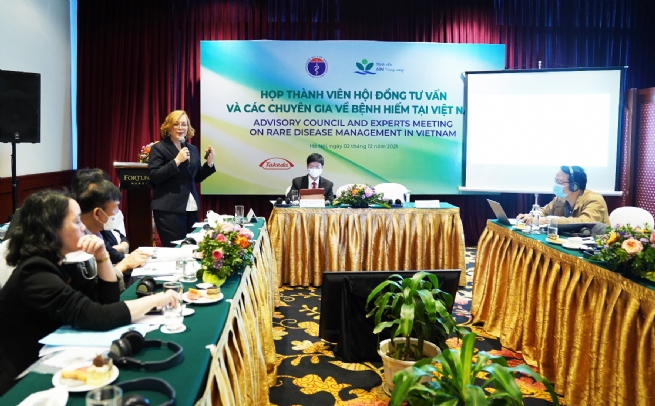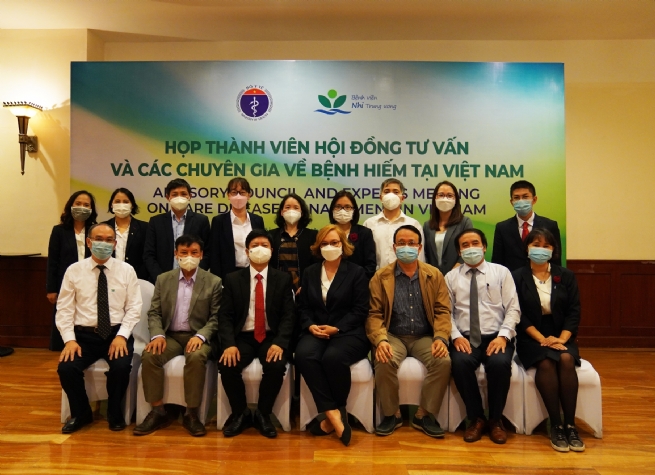5:37:04 PM | 12/2/2021
On December 2, in the “Advisory Council and Experts Meeting on Rare Disease Management in Vietnam” hosted by the National Children’s Hospital and the Medical Services Administration under the Ministry of Health.
The meeting also reviewed the progress of the APEC Rare Disease Action Plan since its implementation in many countries across the region, including Vietnam, over the past few years. In line with this action plan, drafts and discussions of the council on the definition and list of rare diseases, as well as presentations on some rare disease diagnosis, treatment guidelines and management have been developed.

Ms. Katharina Geppert, Country Manager, Takeda Vietnam, delivers a speech at the “Advisory Council and Experts Meeting on Rare Disease Management in Vietnam”
Significant momentum was made since 2018, upon the signing of the Memorandum of Understanding (MOU) on “Improving diagnosis, treatment and management of specific rare diseases in Vietnam” for the period of 2018-2023 between the Medical Services Administration, the Ministry of Health and Takeda Vietnam. Since then, the Medical Services Administration affirmed that Vietnam has made great strides in diagnosing, treatment and management of a number of rare diseases.
Dr. Nguyen Trong Khoa, Deputy Director of the Medical Services Administration, said: “Currently in Vietnam, there are specific therapies and medications for certain rare diseases that help improve the effectiveness of treatment and life quality for patients. The recent journey shows that the expansion of cooperation with leading names in this field has brought positive change to patients, as well as paved the way for patients and HCPs to access advanced treatment methods, enhancing the quality for rare diseases treatment in Vietnam.”
Dr. Vu Chi Dung, Director of Center for Rare Disease and Newborn Screening, National Children’s Hospital, said: “In recent years, diagnosis and treatment of rare diseases around the world and in Vietnam have made considerable progress. The support from partners over the years has helped the hospital to strengthen awareness and understanding of how to treat patients before severe symptoms appear and mitigate the risk of death. Specifically, Takeda has been supporting 10 pediatric patients with MPSII on clinical trial phase 4 at our hospital.”

Vietnam’s doctors and experts in rare diseases gather to join the “Advisory Council and Experts Meeting on Rare Disease Management in Vietnam”
Ms. Katharina Geppert, Country Manager, Takeda Vietnam, said: “Increasing access to innovative medicines for rare diseases is challenging and needs collective action. It must be approached in a sustainable and targeted way, to strengthen and transform healthcare systems, at every stage of the patient journey - from awareness and diagnosis, to treatment and ongoing patient support. Partnering with the Ministry of Health on the creation of patient-centric provisions for the management of rare diseases is another aspect of our local Access to Medicines (AtM) strategy and innovative treatment solutions. Since 2018, Takeda has been contributing to the improvement of diagnosis and treatment for patients with hemophilia and primary immune deficiency - two of the most prevalent rare diseases in the country. On the other hand, we continue to execute our long-term strategies that empower breakthrough treatments, improving patients’ life quality and supporting Vietnam’s healthcare system.”
According to the World Health Organization (WHO), it is estimated that 1 in 15 people is diagnosed with a rare disease, and there are around 6 million rare-disease patients in Vietnam. While in Vietnam, it is reported that there are approximately 100 rare diseases found in the community, according to the Vietnam National Children’s Hospital. The above-mentioned MoU will address two particular rare diseases which are Hemophilia (estimated to afflict about over 6,000 people in Vietnam, but only 3,600 patients have been identified); and Primary Immune Deficiency (PID) (afflicting the prognosis of these patients). After the successes in Hemophilia and PID it is planned to extend the MoU in the future to cover rarer diseases for research, training and care programs in order to improve the lives of more patients.
The Ministry of Health, along with hospitals and partners like Takeda Vietnam have been progressing efforts to study, approach and apply solutions in the treatment of rare diseases. These involve expertise sharing on rare-disease treatment; solutions to control and manage patients with Hemophilia leveraging technologies such as the Zero Bleed app piloted at the National Institute of Hematology & Blood Transfusion; joining hands with the Vietnam Hemophilia Association with the view to improving treatment and life quality for patients with blood clotting disorder to earlier addressing of bleeding at home. Another area of focus is the hosting of workshops for health care providers, who also help raise awareness amongst patients and communities on rare diseases, in collaboration with the National Center for Global Health and Medicine (NCGM) Japan, the Asthma - Allergy - Clinical Immunology Association of Ho Chi Minh City (HSAACI) to implement the project NCGM Competence in Hereditary Angioedema HAE to establish diagnostic methods and strengthen treatment guidelines for hereditary angioedema (HAE) in Vietnam.
D.A (Vietnam Business Forum)